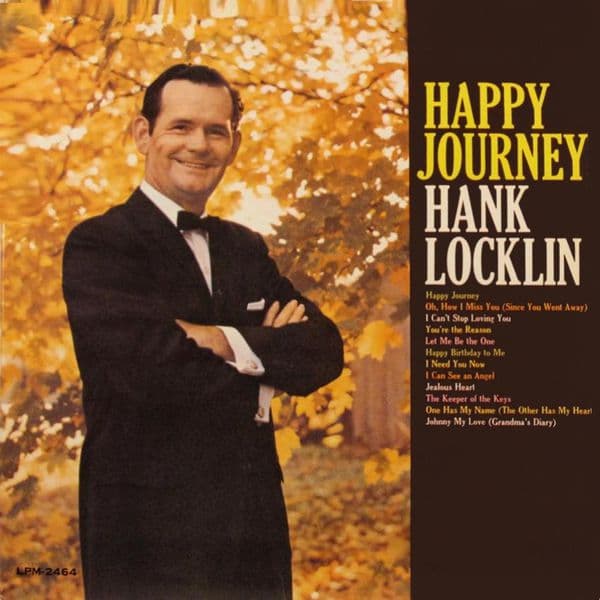
A Somber Celebration: The Bittersweet Loneliness of a Birthday Spent Mourning a Lost Love
Hank Locklin‘s profoundly melancholic and achingly honest ballad, “Happy Birthday to Me”, is a quintessential example of his mastery of the heartbroken country song, infused with that unique blend of dignified sorrow and quiet self-pity. This evocative track was a significant hit for Locklin, reaching an impressive number 7 on the Billboard Hot Country Singles chart in 1961. Its success was a testament to his smooth, emotive delivery and the song’s incredibly relatable portrayal of a mature, albeit deeply sorrowful, acknowledgment of a personal milestone overshadowed by profound loss. While not a crossover pop hit, “Happy Birthday to Me” solidified his reputation as a balladeer capable of conveying deep emotion with a quiet grace, appealing to millions who found solace in his honest portrayal of life’s painful ironies. Featured on his 1961 album, “Hank Locklin” (which performed well on the country charts), this song became a beloved classic for fans who cherished its raw emotional honesty and its timeless depiction of a day meant for celebration turned into a lonely remembrance of a love that is no more.
The story behind “Happy Birthday to Me” is rooted in the insightful songwriting talents of Hugh Ashley. Ashley crafted a lyric that perfectly captures the complex emotions surrounding a birthday spent in the shadow of a lost love. The song’s narrative is a first-person account from a protagonist who is observing his own birthday, a day typically associated with joy and celebration, but finds himself utterly alone and consumed by memories of a past relationship. The irony of the situation is central to the song’s poignancy: the world may expect cheer, but his heart is filled with only sadness. The act of wishing “Happy Birthday to Me” becomes a bitter, almost sarcastic, gesture, highlighting the stark contrast between societal expectation and personal reality. It speaks to the universal human experience of holidays and personal milestones serving as painful reminders of what has been lost, rather than occasions for joy. Hank Locklin, with his distinctive smooth tenor and his remarkably empathetic delivery, was the ideal voice to convey this profound sense of quiet desperation and lingering affection. His rendition imbued the song with an undeniable sincerity and a poignant dignity in its suffering, making the listener feel the depth of such a necessary, yet heartbreaking, realization on a day meant for joy.
The meaning of “Happy Birthday to Me” is a deeply poignant and melancholic reflection on a birthday spent in the painful solitude of a lost love, transforming a day of celebration into an aching reminder of absence. It’s a song about the bitter irony of personal milestones when one’s heart is consumed by sorrow, highlighting the stark contrast between external expectations of happiness and internal desolation. The lyrics convey a profound sense of loneliness and a wistful remembrance of happier times when the beloved was present to share such occasions. The act of the protagonist wishing “Happy Birthday to Me” is a self-pitying, yet dignified, acknowledgment of their isolated state, a testament to enduring heartbreak. Lines like “Happy birthday to me, though it’s not a happy day / For the one I love has gone away, and left me here to stay” perfectly capture this blend of personal anniversary and profound loss. It speaks to the universal human experience of holidays serving as painful echoes of what once was, the quiet agony of loneliness, and the poignant truth that some celebrations are endured, rather than enjoyed, leaving behind the taste of bittersweet memories and an unshared cake.
Hank Locklin‘s vocal performance on “Happy Birthday to Me” is a masterclass in conveying understated, yet incredibly effective, emotional delivery. His voice, clear, warm, and imbued with an inherent tenderness, delivers the resigned lyrics with a palpable sense of wistful acceptance, rather than overt anguish. He sings with a quiet dignity, making the listener feel the profound sadness of a man who understands that some days are simply harder than others, especially when spent alone with memories. The instrumentation, characteristic of the Nashville Sound of the early 1960s, is subtly elegant and supportive, featuring a beautifully weeping steel guitar that perfectly mirrors the melancholic mood, a soft piano melody, and a steady, unobtrusive rhythm section that builds a sense of quiet reflection. This clean, unobtrusive production allows Locklin‘s expressive voice and the song’s heartfelt message to take center stage, creating an atmosphere of profound and dignified sorrow. As a significant single from his self-titled album, it further solidified his versatility as an artist, capable of both passionate declarations and the poignant introspection that defined much of traditional country music.
Listening to “Happy Birthday to Me” today evokes a particular kind of profound nostalgia, transporting us back to a golden era of country music when ballads were crafted with such pure, heartfelt emotion and sung with an unmistakable sincerity. It reminds us of Hank Locklin‘s unique gift for embodying resignation and conveying it with a quiet grace that resonates deeply. For those of us who recall its pervasive charm on the airwaves, this song remains a cherished gem, a timeless anthem for the bittersweet pain of a birthday spent in solitude and the quiet, courageous act of acknowledging one’s own heartbreak. It’s a melody that, even after all these years, continues to resonate with its poignant truth, gently reminding us that sometimes, the most profound emotional honesty can be found in the simplest, most heartbreaking of self-wishes, “Happy Birthday to Me.”